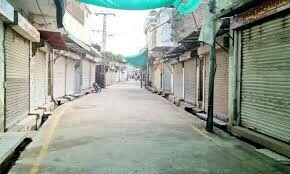AMID a grave economic crisis and the recent Dubai leaks embarrassment, the situation in what people generally believe are ‘peripheral’ areas of Pakistan has drawn the attention of the authorities. Be it Haq do Tehreek in Balochistan, the Awami Action Committee of Gilgit-Baltistan or the Jammu Kashmir Joint Awami Action Committee (JAAC) demanding their rights, what is common in all these movements is that their issues lie in the centre, Islamabad. Through protests, sit-ins, strikes and politics of agitation, these so-called peripheral and marginalised areas are gaining centre stage. A general feeling of dissatisfaction and disenfranchisement among the population seems to be the driving force behind these movements.
The recent protests in AJK led by JAAC didn’t happen overnight. According to one of the senior leaders of JAAC — an alliance of labour leaders, traders, transporters, and civil society members — which led protests and a march towards Muzaffarabad, the demands, which were neither irrational nor unfair, go one year back. They were asking for the electricity rate to be set according to hydropower generation costs in AJK, subsidised wheat flour, and downsizing government officials to spend resources on the public rather than on the ruling elites. Their argument is simple: the AJK government is oversized, and in a population of only four million, it doesn’t need so many ministers and bureaucrats. Their perks are a burden on the region’s budget. However, given the abysmal record of managing crises, the authorities, rather being proactive, adopted a reactive approach.
The unrest began when activists and members of JAAC were detained pre-emptively in overnight raids by law enforcement agencies. This prompted JAAC to call for a strike on May 10 and a march towards Muzaffarabad on May 11. During the several days of unrest, four precious lives were lost and over a hundred were injured. Consequently, in an emergency meeting in Islamabad, PM Shehbaz Sharif met all the demands, and the JAAC called off the protests. The PM announced a grant of Rs23 billion to AJK, which included subsidies on flour and electricity prices. Senior PML-N leader Rana Sanaullah acknowledged that the situation was mishandled and that the damage could have been avoided through early negotiations.
In Pakistan, it has become a pattern to address issues only when they get out of control and result in a full-fledged crisis. The wheat subsidy is not a new issue for the government. Just a few months ago, GB was embroiled in mass protests, sit-ins and strikes for the restoration of the wheat subsidy granted to the region. The anger was also due to the unilateral decisions of the federal government. The demonstrations were led by the Awami Action Committee GB — an alliance of trade unions, religious and political leaders, and CSOs. This was also a repeat telecast. In 2022, similar protests erupted on the same issues. In 2024, however, the AAC had a 15-point demand list which included the restoration of wheat subsidy, suspension of Finance Act, land ownership rights for locals, a share for GB in the NFC Award, royalties from the Diamer-Bhasha dam, an end to prolonged power outages and exploitation of GB’s mineral resources, among others.
A new generation of educated young people is redefining politics in AJK and GB.
The regions of AJK and GB both have a disputed status. They are semi-autonomous regions which have gone through various reforms since 1947. AJK has its own constitution, government and legislative assembly, while GB has only a legislative assembly. However, both regions are politically and financially dependent on the centre. Islamabad maintains a strong grip on their administration through federal bureaucracy. Representatives contest elections on the platforms of mainstream political parties and enter local assemblies with their hands tied. They cannot deviate from their parties’ policies. They often acknowledge the public demands during such protests — as in the case of AJK’s recent protests — but also admit like AJK’s Rural Development Minister Faisal Mumtaz Rathore, that the solution falls in the centre’s jurisdiction.
In both AJK and GB’s cases, the protests and marches occurred only when negotiations with regional governments failed. With these repeated episodes, one wonders why conciliation and crisis management are so difficult for the centre.
Perhaps the starting point for the federal government to manage affairs should be to first realise that a new generation has come of age in both regions, which is detached from traditional politics. This young generation is educated, aware of their rights, and in the majority. They are shaping these rights movements and redefining politics in both AJK and GB. The government of Pakistan should have the answers to their questions. Relying on old methods won’t work and this AJK episode is a glimpse of that. There is no harm in empowering regional governments and granting autonomy in local affairs. It is perhaps the best solution to regain the trust of the people and avoid future unrest.
Self-determination, a catchword linked to Kashmir, generally refers to the right of people to constitute themselves as a nation-state or to integrate with an already existing one. Salvatore Senese divides it into two categories: internal and external. The latter has been already mentioned. Internal self-determination, according to Senese, is ‘the right of people to freely choose their own political, economic, and social system’.
Can Pakistan provide internal self-determination to AJK and GB? The time is ripe for it. The PM has already stressed for permanent solutions to AJK’s problems, which is a promising sign. Only time will tell how serious the government is about providing permanent solutions to the chronic problems of AJK and GB.
The writer is Assistant Professor and fellow of the Centre for Business and Economic Research at IBA, Karachi.
X: @saj_ahmd
Published in Dawn, May 20th, 2024















































Dear visitor, the comments section is undergoing an overhaul and will return soon.